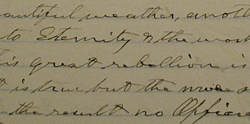History of the Journal
Various generations of Alcander Morse's descendants have contributed to the preservation of his journal over the years.
Following Alcander's death in 1894, the journal passed into the possession of his son, William Morse. In 1925, Charles A. Nash, Alcander's grandson through his eldest daughter Amy, borrowed the journal and undertook the painstaking task of transcribing it on his typewriter. This copy of the journal was distributed to members of the Nash family. (Nash, 7)
In 1995, Charles A. Nash's grandsons, Robert Nash and Charles Nash, began to input the typewritten copy of the journal into a word processor. A small booklet was made and donated to the library at the Prairie Grove Battlefield State Park in Arkansas, where it has been referenced in numerous published works. (Morse, ed. Nash)
Growing up, I was fascinated with this particular piece of family history, and as my research in the Civil War era began to focus upon the personal narratives of soldiers, my thoughts would frequently return to Alcander's journal and its present whereabouts. In 2010, I attempted to track it down. Through of a bit of genealogical research, I was able to locate the descendants of the last known possessor of the journal, and eventually, the journal itself. Not only had it survived the wear and tear of three years of war, but it had successfully made the postwar journey from Illinois to South Dakota and Iowa, finally settling in Northern California in the hands of its author's great-great-grandson.
Upon examining the original document, it was clear that the version of the journal I had been analyzing for years was incomplete. During his 1925 transcription process, Charles A. Nash had taken certain liberties to make the text of the journal more readable. Punctuation had been added, repetitive passages regarding the weather had been removed, grammar had been corrected, and a surprising number of words and sentences were omitted. The original also contained many pages of poetry, presumably written by the author during his wartime travels. (It is my intention to transcribe these poems for eventual inclusion in this project.) It seemed that not only had I found the original journal, but I had also uncovered the author's original voice.1
 |
1Subsequent research of other Civil War era diaries has led me to conclude that this version of the journal may not, in fact, be the version of the diary Alcander carried with him throughout his war service. The journal in the possession of Alcander’s descendants is ledger sized, while most journals of this era are much smaller, pocket-sized books. It may be that the worn condition of the original led Alcander to pen an exact copy—for it is almost certainly his handwriting—right down to the mysterious daily notations in the margins. Regardless of the journal’s history, its authenticity remains unquestioned, as does its usefulness to the field of Civil War studies.
